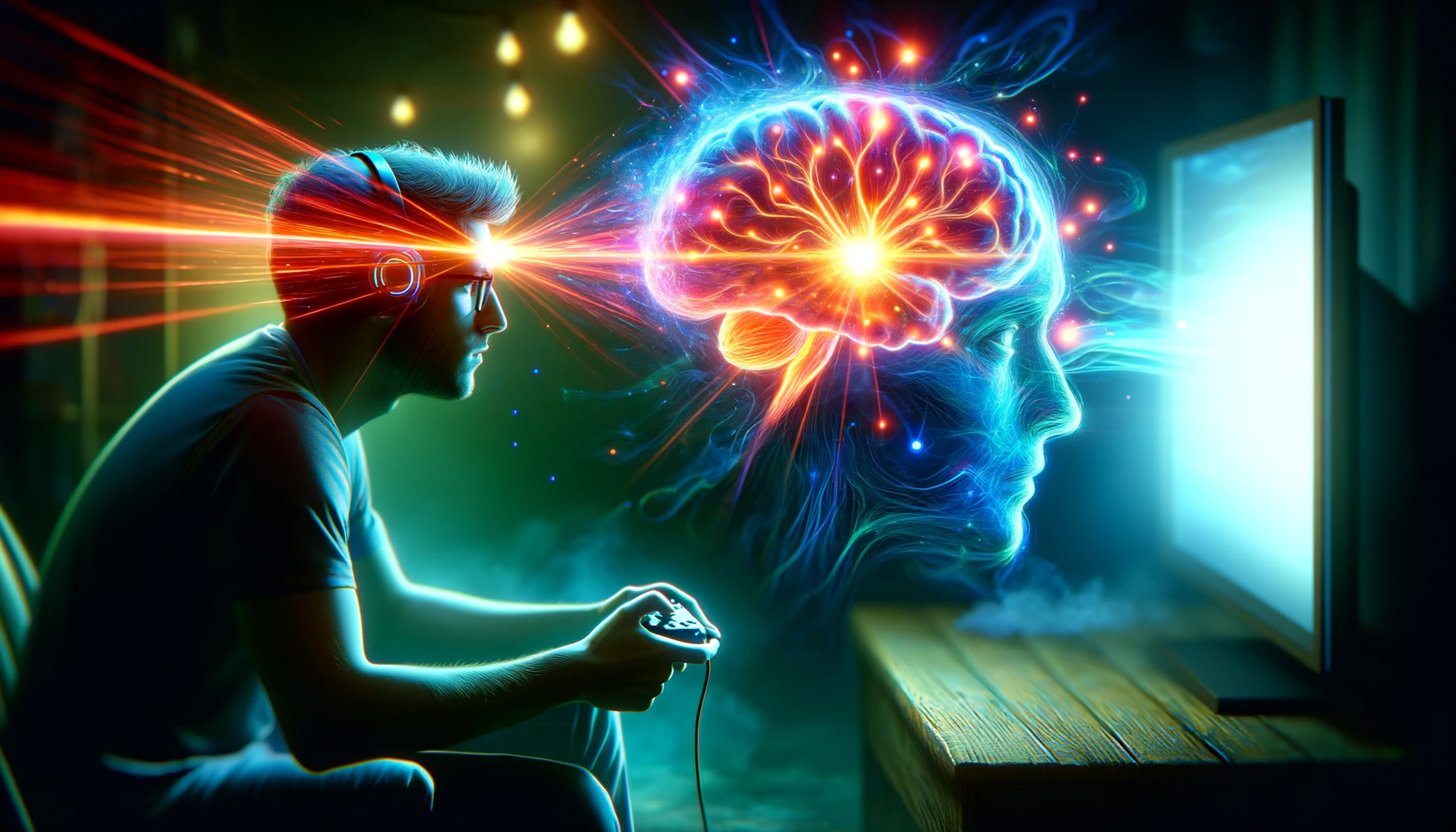In recent years, the relationship between games and cognitive skills has become a prominent topic of discussion. While games, particularly video games, have often been criticized for promoting sedentary behavior and even violence, research has shown that they can also offer significant benefits when it comes to cognitive development and mental acuity. Games, whether they’re action-packed video games, brain-teasers, or strategic board games, have been proven to enhance a variety of cognitive functions, including memory, attention, problem-solving abilities, and decision-making.
This article will explore how different types of games contribute to the enhancement of cognitive skills, dive into the science behind these benefits, and provide answers to frequently asked questions regarding the connection between gaming and cognitive function. Additionally, we’ll conclude by summarizing the key takeaways on how games can positively influence brain health and performance.
1. Types of Games That Enhance Cognitive Skills
While most games have the potential to impact cognitive skills, certain types have been researched more thoroughly and have shown consistent evidence of cognitive enhancement. These include action video games, puzzle games, strategy games, and even educational board games. Here’s how each type of game contributes to cognitive improvement:
Action Video Games
Action video games are fast-paced games that require quick reactions, good hand-eye coordination, and constant attention. They include genres such as first-person shooters, racing games, and action-adventure games. These games have been shown to improve several cognitive functions:
- Visual Attention: Action games require players to maintain focus on fast-moving objects and environments. Studies have shown that players of action games are better at processing visual information, even when the data is cluttered or complex.
- Multi-tasking and Divided Attention: Action games often require players to juggle multiple tasks at once, such as managing health, positioning in the game world, and watching for threats. This can improve a player’s ability to divide their attention across different tasks in real life.
- Reaction Time and Speed: The rapid nature of action games can enhance the brain’s processing speed. Players react to stimuli faster, and their reflexes become sharper with continued exposure to these games.
Puzzle and Logic Games
Games that involve puzzles, logic problems, or pattern recognition—such as crossword puzzles, Sudoku, and match-three games—stimulate the brain’s problem-solving abilities.
- Memory and Recall: Puzzle games often involve remembering pieces of information and solving problems based on that recall. This strengthens both short-term and long-term memory.
- Critical Thinking and Reasoning: Logic games engage the brain in higher-order thinking, encouraging players to use logic, pattern recognition, and reasoning to solve complex puzzles. This type of gaming has been linked to enhanced critical thinking skills.
- Cognitive Flexibility: Many puzzle games require players to switch strategies or think about problems from different angles, promoting mental flexibility and adaptability in real-life problem-solving scenarios.
Strategy Games
Strategy games, such as chess, real-time strategy (RTS) games, and turn-based games, demand careful planning, tactical thinking, and long-term decision-making. These games are excellent at improving several aspects of cognitive function:
- Planning and Forethought: Strategy games require players to think ahead and plan moves in advance, which promotes executive function—the brain’s ability to plan, manage time, and foresee consequences of actions.
- Problem-Solving and Decision-Making: Players must evaluate various options, weigh risks, and make decisions based on limited information. This can help develop better decision-making skills in real-life situations, such as financial planning or even navigating complex social interactions.
- Spatial Awareness: Many strategy games involve navigating large maps or managing resources across different terrains. This helps improve players’ spatial reasoning, or the ability to visualize and manipulate objects in space, which is important for tasks like driving or architecture.
Educational Games
Educational games are specifically designed to enhance learning in areas such as mathematics, language, and science. These games use engaging environments to teach concepts in a fun and interactive way.
- Language and Literacy Skills: Word games, reading challenges, and language-based puzzles promote vocabulary development, spelling, and overall literacy. These games are particularly beneficial for children and can help reinforce lessons learned in the classroom.
- Math and Logical Thinking: Many educational games focus on teaching mathematical concepts through problem-solving and calculation, which can improve numeric literacy and logical reasoning.
- Memory and Retention: Educational games often require players to memorize information, whether it’s historical dates, language vocabulary, or scientific facts. This can enhance long-term memory retention.
2. How Games Affect Different Cognitive Functions
Games have the potential to enhance various cognitive functions, depending on the type of game and the cognitive skills involved. Here’s a deeper look at the major cognitive functions that games can improve:
Memory
Many games—especially those that require memorization, such as card games, memory matching games, and puzzle games—are excellent at improving both short-term and long-term memory. Players are often tasked with recalling certain pieces of information, locations, or sequences in the game, which challenges the brain to strengthen memory pathways.
- Working Memory: Action games and strategy games also boost working memory by forcing players to hold and manipulate information in their minds temporarily while making decisions or navigating complex environments.
Attention and Focus
Games, particularly fast-paced action games, can improve sustained attention and focus. Players must remain engaged in a game for extended periods, maintaining concentration despite distractions or the fast-moving environment.
- Selective Attention: Video games train players to focus on specific objects, tasks, or areas of the game, which improves their ability to block out irrelevant information in real life.
- Divided Attention: Multi-tasking in games enhances a person’s ability to divide their attention between different stimuli and tasks, promoting better task management skills in real life.
Problem-Solving and Critical Thinking
Many games, especially strategy and puzzle games, require critical thinking and problem-solving skills. In these games, players often face challenges that require a series of steps to overcome, and they must evaluate their options to find the best solution.
- Logical Reasoning: Many games, such as chess or puzzle games, require players to apply logic, analyze patterns, and think several steps ahead.
Processing Speed and Reaction Time
Action games, in particular, can increase processing speed, as players must react quickly to dynamic and fast-moving environments. This can translate into faster decision-making in real-life situations, such as responding to an emergency or making quick judgments in the workplace.
Executive Functioning
Strategy games are particularly helpful for improving executive functions like planning, organizing, decision-making, and impulse control. By managing resources, forming strategies, and executing plans in the game, players hone their executive functioning skills, which can lead to better management of personal and professional responsibilities.
3. FAQs about How Games Enhance Cognitive Skills
- Can video games improve memory?
- Yes, certain video games, especially those involving memory tasks (e.g., puzzle games, card games, and strategy games), can enhance both short-term and long-term memory by encouraging recall and memory manipulation.
- What types of games are best for improving cognitive skills?
- Puzzle games, strategy games, and action games are particularly beneficial for improving cognitive skills, including memory, attention, problem-solving, and reaction time.
- How do action games improve cognitive function?
- Action games improve cognitive function by enhancing visual attention, reaction time, multi-tasking abilities, and hand-eye coordination, which translate to faster processing and decision-making in real-life situations.
- Do educational games help with learning?
- Yes, educational games are specifically designed to teach concepts in an engaging manner, making them effective for reinforcing knowledge and improving memory, literacy, and problem-solving skills.
- Are games beneficial for all ages?
- Absolutely. While children can benefit from educational games that promote learning and cognitive development, adults can improve cognitive skills such as critical thinking, memory, and decision-making through complex games.
- Can playing strategy games help with real-life problem-solving?
- Yes, strategy games that require planning and decision-making can improve executive function, which directly impacts real-life problem-solving and planning abilities.
- How much time should I spend playing games to improve cognitive skills?
- It’s important to strike a balance. Spending 30-60 minutes a day on cognitive-enhancing games can be beneficial, but excessive screen time or overindulgence in gaming can lead to negative effects, such as reduced physical activity.
4. Conclusion
Games, whether digital or traditional, offer more than just entertainment—they serve as powerful tools for enhancing cognitive skills. By engaging the brain in various ways, games can improve memory, attention, problem-solving, executive function, and more. Whether through action-packed video games that sharpen reaction times or strategic board games that encourage critical thinking, games are a fun and effective way to boost mental performance.
The key to using games to enhance cognitive skills is moderation. While gaming has its benefits, balance is crucial, and it should complement other healthy lifestyle choices such as physical exercise, social interaction, and intellectual challenges.
Key Takeaways:
- Different types of games, such as action, puzzle, strategy, and educational games, can improve various cognitive functions like memory, attention, problem-solving, and executive function.
- Video games, especially action and strategy games, enhance brain functions such as visual attention, multi-tasking, decision-making, and reaction time.
- Educational games are especially effective in helping children improve literacy, math skills, and problem-solving abilities.
- Gaming can be a powerful tool for improving cognitive skills, but it should be balanced with other forms of mental and physical stimulation for optimal health.

